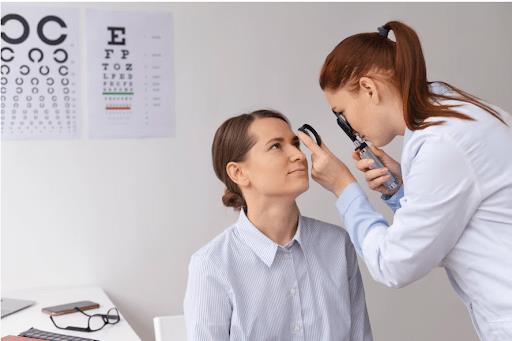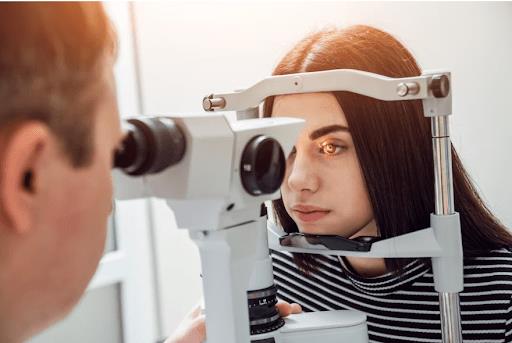Your eyes are one of the most important organs in your body, and regular eye examinations are essential for maintaining good eye health and preventing vision problems. Eye exams can detect various eye conditions, including myopia, hyperopia, astigmatism, cataracts, and glaucoma. In this article, we’ll take a closer look at the importance of eye exams and what to expect during a typical exam.
Why Are Eye Examinations Important?
Eye exams are an essential part of preventative healthcare, and they should be performed regularly, starting from a young age. Many eye conditions can develop gradually, and you may not even realize that your vision is deteriorating until it becomes a significant problem. By having a regular eye examination HK, your eye care professional can detect any potential issues early on and recommend appropriate treatment to prevent further damage.

Eye exams are particularly important for individuals who are at higher risk of developing eye conditions, such as those with a family history of eye diseases, individuals with diabetes or high blood pressure, and those who have a history of eye injuries or surgeries.
What Happens During an Eye Exam?
During an eye exam, your eye care professional will perform several tests to evaluate different aspects of your eye health and vision. Here’s what you can expect during a typical eye exam:
Visual Acuity Test
The visual acuity test is the most common eye test performed during an eye exam. During this test, you will be asked to read a series of letters or numbers from a chart at a specific distance. This test helps determine how well you can see at various distances.
Refraction Test
The refraction test is used to determine whether you have myopia, hyperopia, or astigmatism. During this test, your eye care professional will ask you to look through a phoropter, a device that contains a series of lenses, to determine the optimal prescription for corrective lenses.
Eye Muscle Test
The eye muscle test is used to evaluate the movement and coordination of your eye muscles. Your eye care professional will ask you to follow a moving object with your eyes while they observe your eye movements.
Pupil Dilation
Pupil dilation is a test that involves using eye drops to widen your pupils, allowing your eye care professional to examine the inside of your eye. This test can help detect various eye conditions, including cataracts and glaucoma.
Tonometry Test
The tonometry test measures the pressure inside your eyes, which can help detect glaucoma. During this test, a small device is used to gently touch your eye and measure the pressure.
Visual Field Test
The visual field test evaluates your peripheral vision, which is important for tasks such as driving and navigating. During this test, you will be asked to look straight ahead while small lights are flashed around your field of vision.
What Should You Look for in an Eye Care Professional?
Choosing the right eye care professional is essential for receiving high-quality care and maintaining good eye health. Here are a few things to look for when choosing an eye care professional:
Qualifications and Experience
Choose an eye care professional who is qualified and experienced in performing eye exams and treating various eye conditions. Look for individuals who are licensed and certified by reputable organizations.

Reputation and Reviews
Look for eye care professionals with a good reputation and positive reviews from patients. Online reviews can provide valuable insights into the quality of care provided.
Insurance Coverage
Check whether the eye care professional accepts your insurance. Most insurance plans cover routine eye exams and some eye conditions, but coverage may vary depending on the type of plan and the provider.
Location and Convenience
Choose an eye care professional who is located close to your home or workplace and has convenient office hours that fit your schedule. This can help ensure that you can easily attend appointments and receive timely care when needed.
Technology and Equipment
Look for an eye care professional who uses the latest technology and equipment for diagnosing and treating eye conditions. This can help ensure that you receive the most accurate and effective care possible.
Conclusion:
Regular eye exams are an essential part of maintaining good eye health and preventing vision problems. During an eye exam, your eye care professional will perform several tests to evaluate different aspects of your eye health and vision. It’s important to choose the right eye care professional to ensure that you receive high-quality care and maintain good eye health. Look for individuals who are qualified, experienced, and have a good reputation and positive reviews from patients. Additionally, choose an eye care professional who is conveniently located and accepts your insurance plan. By following these tips, you can ensure that you receive the best possible care for your eyes.
You may be interested in: 5 Tips To Ensure Good Eye Health
------------Read More
By: Edward Bishop
Title: Eye Examinations Reveal Hidden Health Issues
Sourced From: marketbusinessnews.com/eye-examinations-reveal-hidden-health-issues/329361/
Published Date: Wed, 12 Apr 2023 23:47:01 +0000
Did you miss our previous article...
https://trendinginbusiness.business/business/gb-whatsapp-apk-an-ultimate-guide-to-the-popular-modded-whatsapp-application
.png)





